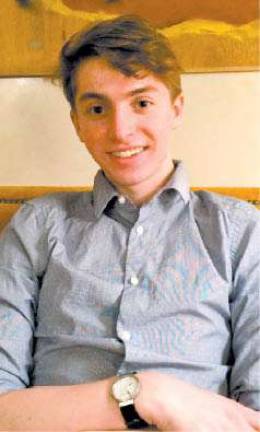Teens on the Community Board

A resolution in the City Council would open up the boards to younger members
Seventeen-year-old Quentin Dupouy became interested in politics when he campaigned for Barack Obama's re-election in 2012. Later he attended community board meetings to draw attention to a program he created to help foreign exchange students learn English. This led him to apply this year to Community Board 7 on the Upper West Side, where he lives, even though he is technically ineligible.
"I was going to my local community board to get some feedback and from the community and get some support and ended up just being fascinated by the meeting and very surprised with how active everyone was," said Dupouy. "Since then it's just really made me want to go back and be a part of it."
Dupouy may soon get his chance.
Manhattan Borough President Gale Brewer and Upper East Side Councilmember Ben Kallos are sponsoring a resolution in the City Council to allow 16 and 17-year-olds to serve on the city's 59 community boards, which are advisory groups that tackle everything from crime and development to the approval of liquor licenses.
"Most 16 and 17-year-olds cannot serve on a community board," Brewer said. "But those who can, what it says is that they have another perspective about the community - after-school programs, playgrounds, parks - and somebody who's really smart can figure out how to work with the adults and get the young person's perspective across."
Brewer said that as a council member 10 years ago, she supported a measure to allow 16 and 17 year olds to vote in citywide elections, but the support among her colleagues wasn't there. "So then we decided to look at community boards," said Brewer, who left the council to become Manhattan Borough President in January.
The City Council must go before the state legislature to make changes to the age requirements for community board service, as it would modify the state's Public Officers Law. Current regulations require an applicant to be 18 years old. There is, however, a precedent for 16-year-olds to serve on community boards: Comptroller Scott Stringer received special permission to serve on a board at age 16.
Brewer has seen a changing of attitudes toward the idea. "I think there's quite a bit of support for it in this city council, we didn't get as much before," she said.
There's also support at the state level. Staten Island Assemblyman Andrew Lanza and Queens Assemblywoman Nily Rozic are sponsoring separate legislation to allow anyone who's at least 16 years old to serve on community boards.
"New York City has 8.3 million residents, and more than 20 percent of them are under 18," said Kallos. "Community boards have a mandate for being representative of their communities, and I think the best way we can do that is giving 16 and 17-year-olds a voice on their community boards that will encourage them to be civically engaged for a lifetime."
When attending community board meetings, Dupouy said he noticed there was an overwhelming majority of older members. "I think I was maybe one of two people below the age of 40. Seeing that made me feel that I could add something to the discussion."
Dupouy, a junior at Hunter High School, said that if he were appointed to CB7 he would focus on school overcrowding and transportation issues for high schoolers, as well as beefing up after-school programs.
Although CB7 had the highest number of applicants of any community board, and although he's not technically eligible, Dupouy is hopeful he'll be appointed, given Brewer's support and the fact he'll turn 18 in October.
"I definitely see it as a long shot, but it's something that's worth pursuing," said Dupouy.
Austin Ochoa, 18, applied to Community Board 4, which has parts of the West Side and Chelsea. He said he's been to community board meetings that "are dead," and enthusiasm is another asset that youth have in abundance.
"A lot of community board members don't show up," said Ochoa. "I believe if youth had a reason to be there, we would be there without a doubt."
Ochoa does see himself as somewhat of an anomaly, and recognized that civic service at such a young age isn't for everyone, but "there are many other voices standing behind me, and with me, saying that we would like a voice at the table. For far too long youth of my generation has been ignored. And not even just in my generation, but in generations past."
Ochoa, who is studying political philosophy and digital media at CUNY, and interning for a City Council member, likes his chances of being appointed April 1.
"Youth needs a voice and needs an image somewhere in city government, and why not here?" he said.